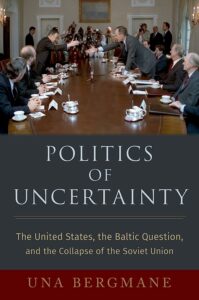Book Launch: Politics of Uncertainty: The United States, the Baltic Question, and the Collapse of the Soviet Union
This April the Cold War Research Network is delighted to invite you to the presentation of Una Bergmane’s new book Politics of Uncertainty: The United States, the Baltic Question, and the Collapse Soviet Union (Oxford University Press, April 2023).

In March 1990, Lithuania became the first Soviet Republic to declare its independence. Within weeks, the two other Baltic states, Estonia and Latvia, announced the beginning of a transition period toward full sovereignty. The Soviet Union, which considered the Baltic declarations illegal, harshly condemned them and imposed an economic blockade against Lithuania. Fearing an outbreak of violence in the region, the United States tried to de-escalate the crisis, pressuring all sides to engage in dialogue.
Thirty years after the Soviet collapse Politics of Uncertainty investigates the interplay between international and domestic dynamics in the Soviet disintegration process. Based on extensive multilingual archival research, this book recovers the voices of local actors in Riga, Tallinn, and Vilnius in its examination of the triangular relations between Washington, Moscow, and Baltic independence movements. Occupied and annexed by the USSR in 1940, Estonia, Latvia, and Lithuania were the first Soviet republics to push the limits of Perestroika. The Baltic problem, at first seemingly minor, increasingly gained international visibility and by 1990 risked derailing issues that mattered in the eyes of both Soviet and American leaders—the transformation of the Soviet state and transformation of the European order. The United States, which had never recognized the annexation of the Baltic states, tried to perform a highly challenging balancing act of supporting Baltic independence without jeopardizing relations with the Kremlin. Meanwhile Mikhail Gorbachev, who saw the Baltics as an integral part of the USSR, was frustrated that their secessionist tendencies distracted from the monumental opportunity for change that the Perestroika project offered to his country and the world. Meanwhile, George Bush, François Mitterrand, and Helmut Kohl were exasperated that events at the margins of the Soviet empire risked destabilizing Gorbachev and souring East-West relations during negotiations over German reunification.
By focusing on the relations between those at the top of global power hierarchies and those situated at their margins, Una Bergmane underscores how the Soviet collapse was driven much more by uncertainty, domestic pressures, and last-minute decisions than by long-term strategy—while warning about the tenuous geopolitical positions of these three states that joined NATO and the European Union after breaking out of the Soviet empire.
Furthemore, the Cold War Research Network is happy to announce that Utrecht Universtity’s own, Dr. Lilian Stadler, will be participating in the event as a discussant.
Una Bergmane is an Academy of Finland Research Fellow at the Aleksanteri Institute, the Finnish Centre for Russian and Eastern European Studies, at Helsinki University. Before joining Aleksnateri Inistute Una was a postdoctoral fellow at Cornell University, and a teaching fellow at the LSE. She holds a Ph.D. from Sciences Po Paris. Her first book “Politics of Uncertainty: the United States, the Baltic Question, and the Collapse of the Soviet Union” (OUP, 2023) investigates the triangular relations between the US government, Baltic independence movements, and Moscow during the perestroika years.
Back

